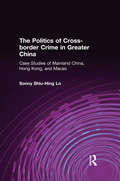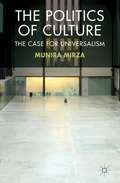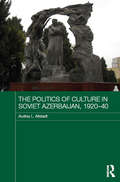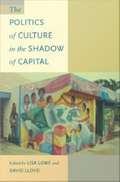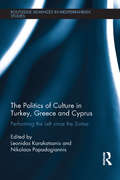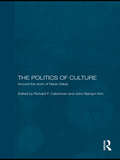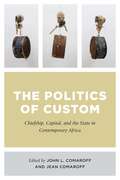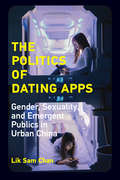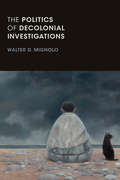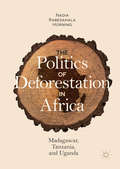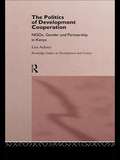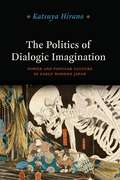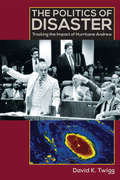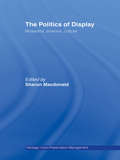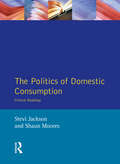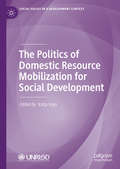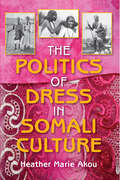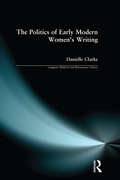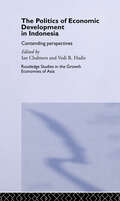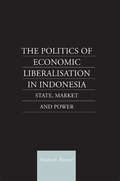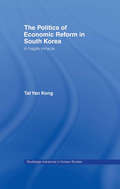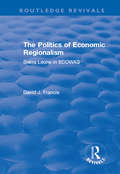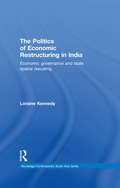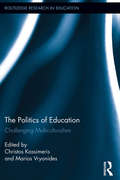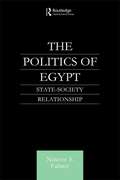- Table View
- List View
The Politics of Cross-border Crime in Greater China: Case Studies of Mainland China, Hong Kong, and Macao (Hong Kong Becoming China Ser.)
by Sonny Shiu-Hing LoOrganized crime has been on the rise in the Greater China region since the People's Republic opened up its economy and society in the mid-1980s. Today, triads from Hong Kong, Macao, and even Taiwan are involved in businesses in Guangdong Province, and often recruit local Chinese for illegal activities such as extortion, kidnapping, assassinations, and smuggling of illegal aliens.This book provides a detailed and comprehensive study of how the state at the central and local levels has responded to the changing patterns and activities of cross-border crime in Greater China. It discusses the theoretical concept of organized crime; the transnational nature of organized crime in recent years; the significance of studying organized crime in Greater China; and the implications for the national security of other countries such as the United States, Canada, and Australia.The author reviews the history of organized crime and secret societies, and addresses the legal complexities of dealing with criminal groups in the region. He covers such topics as money laundering, the financing of terrorist activities, and regional efforts in fighting terrorism.
The Politics of Culture
by Munira MirzaThe idea of diversity dominates cultural policy in the twenty-first century. Against the perceived elitism of the past, policy-makers seek to use culture to address social exclusion. Drawing on original research, this book exposes problems with this approach, making the case for universalism in cultural and political life.
The Politics of Culture in Soviet Azerbaijan, 1920-40 (Routledge Studies in the History of Russia and Eastern Europe)
by Audrey AltstadtThe early Soviet Union’s nationalities policy involved the formation of many national republics, within which "nation building" and "modernization" were undertaken for the benefit of "backward" peoples. This book, in considering how such policies were implemented in Azerbaijan, argues that the Soviet policies were in fact a form of imperialism, with "nation building" and "modernization" imposed firmly along Soviet lines. The book demonstrates that in Azerbaijan, and more widely among western Turkic peoples, the Volga and Crimean Tatars, there were before the onset of Soviet rule, well developed, forward looking, secular, national movements, which were not at all "backward" and were different from the Soviets. The book shows how in the period 1920 to 1940 the two different visions competed with each other, with eventually the pre-Soviet vision of Azerbaijani culture losing out, and the Soviet version dominating in a new Soviet Azerbaijani culture. The book examines the details of this Sovietization of culture: in language policy and the change of the alphabet, in education, higher education and in literature. The book concludes by exploring how pre-Soviet Azerbaijani culture survived to a degree underground, and how it was partially rehabilitated after the death of Stalin and more fully in the late Soviet period.
The Politics of Culture in The Shadow of Capital
by David Lloyd Lisa LoweGlobal in scope, but refusing a familiar totalizing theoretical framework, the essays in The Politics of Culture in the Shadow of Capital demonstrate how localized and resistant social practices--including anticolonial and feminist struggles, peasant revolts, labor organizing, and various cultural movements--challenge contemporary capitalism as a highly differentiated mode of production. Reworking Marxist critique, these essays on Asia, Latin America, the Caribbean, North America, and Europe advance a new understanding of "cultural politics" within the context of transnational neocolonial capitalism. This perspective contributes to an overall critique of traditional approaches to modernity, development, and linear liberal narratives of culture, history, and democratic institutions. It also frames a set of alternative social practices that allows for connections to be made between feminist politics among immigrant women in Britain, women of color in the United States, and Muslim women in Iran, Egypt, Pakistan, and Canada; the work of subaltern studies in India, the Philippines, and Mexico; and antiracist social movements in North and South America, the Caribbean, and Europe. These connections displace modes of opposition traditionally defined in relation to the modern state and enable a rethinking of political practice in the era of global capitalism. Contributors. Tani E. Barlow, Nandi Bhatia, Dipesh Chakrabarty, Chungmoo Choi, Clara Connolly, Angela Davis, Arturo Escobar, Grant Farred, Homa Hoodfar, Reynaldo C. Ileto, George Lipsitz, David Lloyd, Lisa Lowe, Martin F. Manalansan IV, Aihwa Ong, Pragna Patel, Jos Rabasa, Maria Josefina Saldaa-Portillo, Jaqueline Urla
The Politics of Culture in Turkey, Greece & Cyprus: Performing the Left Since the Sixties (Routledge Advances in Mediterranean Studies)
by Nikolaos Papadogiannis Leonidas KarakatsanisPerforming a political identity usually involves more than just casting a vote. For Left-wingers in Turkey, Greece and Cyprus – countries that emerged as the only non-socialist constituents of South-eastern Europe after WWII – political preference meant immersion to distinct ways of life, to ‘cultures’: in times of dictatorship or persecution, the desire to find alternative ways to express themselves gave content to these cultures. In times of political normality, it was the echoes of such memories of precarity and loss that took the lead. This book explores the intersection between the politics and cultures of the Left since the sixties in Turkey, Greece and Cyprus. With the use of 12 case studies, the contributors expose the moments in which the Left has been claimed and performed, not only through political manifestos and traditional political boundaries, but also through corporeal acts, discursive practices and affective encounters. These are all transformed into distinct modalities of everyday life and conduct, which are commemorated, narrated or sung, versed, painted, or captured in photographic images and on reels of tape. By focusing on culture and performance, this book highlights the complex link between nationalism and internationalism in left-wing cultures, and illuminates the entanglements between the ways in which left-wingers experienced transitions from dictatorship to democracy and vice versa. As the first book to analyse cultures and performances of the Left in the three countries, The Politics of Culture in Turkey, Greece and Cyprus causes a rethinking of the boundaries of political practice and fosters new understandings of the formation of diverse expressions of the Left. As such, it will be a valuable resource for students and scholars of cultural and social anthropology, modern European history and political science.
The Politics of Culture: Around the Work of Naoki Sakai (Routledge/Leiden Series in Modern East Asian Politics, History and Media)
by Richard F. CalichmanNaoki Sakai is an important and prominent thinker in Asian and cultural studies and his work continues to make itself felt across a broad range of both national and disciplinary borders. Originally finding a home in the otherwise circumscribed field of Japan Studies, Sakai’s writings have succeeded in large part in destabilizing that home, exposing the fragility of its boundaries to an outside that threatens constantly to overwhelm it. Bringing together an expert team of contributors from North America, Europe and Russia, this volume takes the groundbreaking work of Naoki Sakai as its starting point and broadens the scope of Cultural Studies to bridge across philosophy and critical theory. At the same time it explicitly problematizes the putative divide between "Asian" and "Western" research objects and methodologies, and the link between culture and the nation. The Politics of Culture will appeal to upper level undergraduates and graduates in Asian studies, cultural studies, comparative literature and philosophy.
The Politics of Custom: Chiefship, Capital, and the State in Contemporary Africa
by John L. Comaroff Jean ComaroffHow are we to explain the resurgence of customary chiefs in contemporary Africa? Rather than disappearing with the tide of modernity, as many expected, indigenous sovereigns are instead a rising force, often wielding substantial power and legitimacy despite major changes in the workings of the global political economy in the post–Cold War era—changes in which they are themselves deeply implicated. This pathbreaking volume, edited by anthropologists John L. Comaroff and Jean Comaroff, explores the reasons behind the increasingly assertive politics of custom in many corners of Africa. Chiefs come in countless guises—from university professors through cosmopolitan businessmen to subsistence farmers–but, whatever else they do, they are a critical key to understanding the tenacious hold that “traditional” authority enjoys in the late modern world. Together the contributors explore this counterintuitive chapter in Africa’s history and, in so doing, place it within the broader world-making processes of the twenty-first century.
The Politics of Dating Apps: Gender, Sexuality, and Emergent Publics in Urban China (The Information Society Series)
by Lik Sam ChanAn examination of dating app culture in China, across user demographics--straight women, straight men, queer women, and queer men.In this exploration of dating app culture in China, Lik Sam Chan argues that these popular mobile apps are not merely a platform for personal relationships but also an emerging arena for gender and queer politics. Chan examines the opportunities dating apps present for women's empowerment and men's performances of masculinity, and he links experiences of queer dating app users with their vulnerable position as sexual minorities. He finds that dating apps are both portals to an exciting virtual world of relational possibilities and sites of power dynamics that reflect the heteronormativity and patriarchy of Chinese society.
The Politics of Decolonial Investigations (On Decoloniality)
by Walter D. MignoloIn The Politics of Decolonial Investigations Walter D. Mignolo provides a sweeping examination of how coloniality has operated around the world in its myriad forms from the sixteenth century to the twenty-first. Decolonial border thinking allows Mignolo to outline how the combination of the self-fashioned narratives of Western civilization and the hegemony of Eurocentric thought served to eradicate all knowledges in non-European languages and praxes of living and being. Mignolo also traces the geopolitical origins of racialized and gendered classifications, modernity, globalization, and cosmopolitanism, placing them all within the framework of coloniality. Drawing on the work of theorists and decolonial practitioners from the Global South and the Global East, Mignolo shows how coloniality has provoked the emergence of decolonial politics initiated by delinking from all forms of Western knowledge and subjectivities. The urgent task, Mignolo stresses, is the epistemic reconstitution of categories of thought and praxes of living destituted in the very process of building Western civilization and the idea of modernity. The overcoming of the long-lasting hegemony of the West and its distorted legacies is already underway in all areas of human existence. Mignolo underscores the relevance of the politics of decolonial investigations, in and outside the academy, to liberate ourselves from canonized knowledge, ways of knowing, and praxes of living.
The Politics of Deforestation in Africa: Madagascar, Tanzania, And Uganda
by Nadia Rabesahala HorningThis book explores how environmental policies are made and enforced in Africa. Specifically, this project explains the gap between intent and impact of forest policies, focusing on three African societies facing persistent deforestation today: Madagascar, Tanzania, and Uganda. The central claim of the study is that deforestation persists because conservation policies and projects, which are largely underwritten by foreign donors, consistently ignore the fact that conservation is possible only under limited and specific conditions. To make the case, the author examines how decision-making power is negotiated and exercised where communities make environmental decisions daily (local level) and where environmental policies are negotiated and enacted (national level) across three distinct African political systems.
The Politics of Development Co-operation: NGOs, Gender and Partnership in Kenya (Routledge Studies in Development and Society)
by Lisa AubreyFirst Published in 2004. Routledge is an imprint of Taylor & Francis, an informa company.
The Politics of Dialogic Imagination: Power and Popular Culture in Early Modern Japan (Chicago Studies in Practices of Meaning)
by Katsuya HiranoIna"The Politics of Dialogic Imagination," Katsuya Hirano seeks to understand why, with its seemingly unrivaled power, the Tokugawa shogunate of early modern Japan tried so hard to regulate the ostensibly unimportant popular culture of Edo (present-day Tokyo)OCoincluding fashion, leisure activities, prints, and theater. He does so by examining the works of writers and artists who depicted and celebrated the culture of play and pleasure associated with EdoOCOs street entertainers, vagrants, actors, and prostitutes, whom Tokugawa authorities condemned to be detrimental to public mores, social order, and political economy. Hirano uncovers a logic of politics within EdoOCOs cultural works that was extremely potent in exposing contradictions between the formal structure of the Tokugawa world and its rapidly changing realities. He goes on to look at the effects of this logic, examining policies enacted during the next eraOCothe Meiji periodOCothat mark a drastic reconfiguration of power and a new politics toward ordinary people under modernizing Japan. Deftly navigating JapanOCOs history and culture, a"The Politics of Dialogic Imagination"provides a sophisticated account of a country in the process of radical transformationOCoand of the intensely creative culture that came out of it. "
The Politics of Disaster: Tracking the Impact of Hurricane Andrew
by David K Twigg"[A] careful, nuanced approach in examining the effects of a hurricane on a region’s electoral politics at all levels of government, including localities sometimes neglected by American political science but central to disaster politics."--Political Science Quarterly "Twigg has thoroughly researched. . . . [and] assembled an impressive array of facts by pouring through scholarly documents, books, and back issues of magazines."--Florida Historical Quarterly "A rigorous study of disaster's impact on elected local and state political officials, on their electoral fortunes or misfortunes, and on the local political fabric of impacted jurisdictions."--Richard T. Sylves, George Washington University "A significant contribution to the field of disaster studies."--Naim Kapucu, University of Central Florida From earthquakes to tornados, elected officials' responses to natural disasters can leave an indelible mark on their political careers. In the midst of the 1992 primary season, Hurricane Andrew overwhelmed South Florida, requiring local, state, and federal emergency responses. The work of many politicians in the storm's immediate aftermath led to a curious "incumbency advantage" in the general election a few weeks later, raising the question of just how much the disaster provided opportunities to effectively "campaign without campaigning." David Twigg uses newspaper stories, scholarly articles, and first person interviews to explore the impact of Hurricane Andrew on local and state political incumbents, revealing how elected officials adjusted their strategies and activities in the wake of the disaster. Not only did Andrew give them a legitimate and necessary opportunity to enhance their constituency service and associate themselves with the flow of external assistance, but it also allowed them to achieve significant personal visibility and media coverage while appearing to be non-political or above "normal" politics. This engrossing case study clearly demonstrates why natural disasters often privilege incumbents. Twigg not only sifts through the post-Andrew election results in Florida, but he also points out the possible effects of other past (and future) disaster events on political campaigns in this fascinating and prescient book.
The Politics of Display: Museums, Science, Culture (Heritage: Care-Preservation-Management)
by Sharon MacdonaldThe assumption that museum exhibitions, particularly those concerned with science and technology, are somehow neutral and impartial is today being challenged both in the public arena and in the academy. The Politics of Display brings together studies of contemporary and historical exhibitions and contends that exhibitions are never, and never have been, above politics. Rather, technologies of display and ideas about 'science' and 'objectivity' are mobilized to tell stories of progress, citizenship, racial and national difference. The display of the Enola Gay, the aircraft which dropped the atomic bomb on Hiroshima is a well-known case in point.The Politics of Display charts the changing relationship between displays and their audience and analyzes the consequent shift in styles of representation towards interactive, multimedia and reflexive modes of display. The Politics of Display brings together an array of international scholars in the disciplines of sociology, anthropology and history. Examples are taken from exhibitions of science, technology and industry, anthropology, geology, natural history and medicine, and locations include the United States of America, Australia, the United Kingdom, France, the Netherlands and Spain.This book is an excellent contribution to debates about the politics of public culture. It will be of interest to students of sociology, anthropology, cultural studies, museum studies and science studies.
The Politics of Domestic Consumption: Critical Readings
by Stevi Jackson Shaun MooresThis Reader brings together a broad range of critical work on on the everday practices and power relations of domestic consumption -drawing on material from sociology, women's studies and media and cultural studies. The book is divided into five main sections - on economics, food and clothing, leisure and media reception, household technologies, and the construction of home - and its selected contributions examine the social dynamics of gender: generation, class and ethnicity.
The Politics of Domestic Resource Mobilization for Social Development (Social Policy in a Development Context)
by Katja HujoAt a time when the development community is grappling with the challenge of raising the required investment—estimated in the trillions of dollars—for attainment of the Sustainable Development Goals (SDGs), countries’ mobilization of their own fiscal revenues is receiving increasing attention. This edited volume discusses the political and institutional contexts that enable poor countries to mobilize domestic resources for global commitments and national development priorities. It examines the processes and mechanisms that connect the politics of resource mobilization and demands for social provision; changes in state-citizen, state-business and donor-recipient relations associated with resource mobilization and allocation; and governance reforms that can lead to improved and sustainable public revenues and services. The volume is unique in putting a spotlight on the political drivers of domestic resource mobilization in a rapidly changing global environment and in different country contexts in Latin America, Asia and sub-Saharan Africa. It will appeal to a broad academic audience in the fields of economics, development studies and social policy, as well as practitioners, activists and policy makers.
The Politics of Dress in Somali Culture
by Heather M. AkouThe universal act of dressing—shared by both men and women, young and old, rich and poor, minority and majority—has shaped human interactions, communicated hopes and fears about the future, and embodied what it means to be Somali. Heather Marie Akou mines politics and history in this rich and compelling study of Somali material culture. Akou explores the evolution of Somali folk dress, the role of the Somali government in imposing styles of dress, competing forms of Islamic dress, and changes in Somali fashion in the U.S. With the collapse of the Somali state, Somalis continue a connection with their homeland and community through what they wear every day.
The Politics of Early Modern Women's Writing (Longman Medieval and Renaissance Library)
by Danielle ClarkeThe Politics of Early Modern Women's Writing provides an introduction to the ever-expanding field of early modern women's writing by reading texts in their historical and social contexts. Covering a wide range of forms and genres, the author shows that rather than women conforming to the conventional 'chaste, silent and obedient' model, or merely working from the 'margins' of Renaissance culture, they in fact engaged centrally with many of the major ideas and controversies of their time. The book discusses many previously neglected texts and authors, as well as more familiar figures such as Mary Sidney, Countess of Pembroke, Isabella Whitney and Lady Mary Wroth, and draws attention to the importance of genre and forms of circulation in the production of meaning. The Politics of Early Modern Women will be of interest both to those encountering this material for the first time, and to students and scholars working in the fields of women's writing, gender studies, history and literature.
The Politics of Economic Development in Indonesia: Contending Perspectives (Routledge Studies in the Growth Economies of Asia)
by Vedi R. Hadiz Ian ChalmersDespite increased Western interest in Indonesian economic growth, domestic interpretations remain largely unknown outside Indonesia and have rarely been available in English. Translating key speeches and articles from the political debates surrounding Indonesian economic development, the authors present and analyse trends in development thinking by leading Indonesian figures over the last thirty years.
The Politics of Economic Liberalization in Indonesia: State, Market and Power
by Andrew RosserThis book examines the dynamics shaping the economic process of economic liberalisation in Indonesia since the mid-1980's. Much writing on the process of economic liberalisation in developing countries views economic liberalisation as the victory of economic rationality over political and social interests. In contrast, this book argues that economic liberalisation should not be understood in these terms, but rather in the way that political social interests shape processes of economic reform in both a positive and negative sense. Specifically, Rosser argues that economic liberalisation needs to be understood in terms of the extent to which economic crises shift the balance of power and influence within society away from coalitions opposed to reform and towards those in favour of reform. In the Indonesian context, the main coalitions that need to be examined in this respect are the politico-bureaucrats and the conglomerates who have generally opposed reform and mobile capitalists who have generally supported reform.Based on extensive original research, and providing much new material, the book considers the politics of economic policy-making in Indonesia in a range of sectors including the capital market, intellectual property law, the banking industry, and the trade and investment sectors. Analysing why the nature of economic policy in Indonesia has varied over time, this study argues that there is nothing inevitable about a transition to a fully-fledged liberal market order in Indonesia, and outlines possible future scenarios for the country's political economy.
The Politics of Economic Reform in South Korea: A Fragile Miracle (Routledge Advances in Korean Studies #No.1)
by Tat Yan KongThis comprehensive and authoritative account of the development of the Korean economy combines an historical approach with a substantial treatment of the new economy. Its fresh analysis of the recent transition and systematic treatment of labour issues represent a significant contribution to the scholarship on the politics of development. It is an essential resource for students of comparative political economy and East Asian development.
The Politics of Economic Regionalism: Sierra Leone in ECOWAS (Routledge Revivals)
by David J FrancisThis title was first published in 2001: The primary objective of this book is to provide an analytical understanding of the nature, dynamics and complexity of the politics of economic regionalism through the prism of Sierra Leone in the Economic Community of West African States (ECOWAS). The book also discusses the following issues: the evolution of economic regionalism in West Africa and the conceptual framework for analysis; the expansion of the economic regionalism; developments within the West Africa sub-region with that of the transformation of the global economy and international political system; political, economic and security developments within ECOWAS; and the civil war in Sierra Leone.
The Politics of Economic Restructuring in India: Economic Governance and State Spatial Rescaling (Routledge Contemporary South Asia Series)
by Loraine KennedyState re-scaling is the central concept mobilized in this book to interpret the political processes that are producing new economic spaces in India. In the quarter century since economic reforms were introduced, the Indian economy has experienced strong growth accompanied by extensive sectoral and spatial restructuring. This book argues that in this reformed institutional context, where both state spaces and economic geographies are being rescaled, subnational states play an increasingly critical role in coordinating socioeconomic activities. The core thesis that the book defends is that the reform process has profoundly reconfigured the Indian state’s rapport with its territory at all spatial scales, and these processes of state spatial rescaling are crucial for comprehending emerging patterns of economic governance and growth. It demonstrates that the outcomes of India’s new policy regime are not only the product of impersonal market forces, but that they are also the result of endogenous political strategies, acting in conjunction with the territorial reorganisation of economic activities at various scales, ranging from local to global. Extensive empirical case material, primarily from field-based research, is used to support these theoretical assertions. Scholars of political economy, political and economic geography, industrial development, development studies and Asian Studies will find this a stimulating and innovative contribution to the study of the political economy in the developing countries.
The Politics of Education: Challenging Multiculturalism (Routledge Research in Education)
by Christos Kassimeris and Marios VryonidesEducation is a thoroughly political enterprise. The process of determining the purpose of education has always been highly controversial. It has resulted in disputes that have not only divided people philosophically, but also on the basis of religion, region, class, race, and ethnicity. As a result, education provides us with a spectacular arena in which to explore the tensions inherent in European and North American societies, as well as an understanding of how current politics shape education policy. This book focuses on the politics of education, relating to the formation of national identities as affected by globalization and multiculturalism. It assesses the ways in which governance institutions, political ideologies and competing interests, both within and outside of the education community, influence the content, form, and functioning of education. As a collection of studies of the political aspects of education and educational policy-making, this book reaffirms that educational phenomena reflect and inevitably serve specific political agendas. Political scientists, sociologists and education scholars will find this to be an important and valuable text.
The Politics of Egypt: State-Society Relationship
by Ninette S. FahmyThis book addresses two important matters of current concern to Middle East scholars: firstly, the nature of the Egyptian state and society and the interactive process between them and secondly, how change, which would finally lead to development, can be initiated. The book argues that the Egyptian case represents a weak authoritarian state, which through its coercive and repressive policies towards various societal forces, political parties, professional associations and organisations and individuals, creates a weak society. Individual behaviour in urban and rural communities, sometimes viewed as signs of the strength of societal forces, is seen here as a symptom of a weak and fragmented society. The existence of a weak society in turn impedes government objectives and hinders the implementation of developmental policies and programmes, further weakening the state. This being the case, change has to be initiated externally in both the political and economic spheres.
